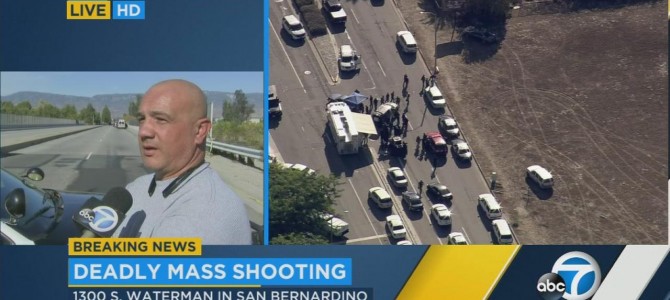
It’s never a good idea to jump to conclusions.
That seems like a rather silly thing to say in the days of instantaneous reaction. But a government official did tell CNN that the San Bernardino shooters had “overseas communications and associations” with terror suspects. The police say Syed Rizwan Farook was “radicalized” and had watched ISIS propaganda videos. We know he had an arsenal in his home, including a dozen pipe bombs, and left behind a remote-control explosive that was similar to the one used by the Boston bombers. The shooting seems to have something to do with Islamic extremists.
When that reality began to kick in, chatter in the liberal Twitterverse quickly turned from torturous efforts to steer motivations in a certain direction, to dismissing motivation altogether, to dressing down Christians for praying too much, to accusing the National Rifle Association and pro-gun Republicans of being complicit in 355 mass shootings (a concocted statistic used by many gun control advocates.)
Since neither of the shooters was known to the police nor had been tagged as a terror risk by the feds, there’s probably no amount of regulation (barring confiscation) that could have stopped them from engaging in this premeditated rampage. It’s debatable whether gun control efforts would reduce violence, anyway.
But, terror or no terror, most of the media would not be knocked off message. Politico ran a piece with this headline: “GOP unmoved on gun control as massacres pile up.” “Democrats unmoved on fighting terror as bodies pile up” would be an equally ugly headline, but we’re used to this kind of bias being embedded in coverage.
What is somewhat new to our discourse—now a standard among progressives—is the idea that there’s a white-Christian-conservative-male-terror problem sweeping though the nation just as serious and scary as radical Islam.
Amazing to watch people who said the motive didn’t matter at Planned Parenthood shooting now saying motive here is all that matters.
— Christopher Hayes (@chrislhayes) December 3, 2015
Have pro-lifers ever argued that the motives of the Planned Parenthood shooter didn’t matter? Of course motive matters. Motives are exactly what make Islamic terror so unique and dangerous.
There is an important distinction between the type of violence we saw at the Colorado Planned Parenthood facility (and we don’t know everything about that incident, either) and what likely happened in San Bernardino. Those who kill for Islam are part of a worldwide ideological and political movement that includes, to various degrees, radicalized men and women from both great factions of the faith. Terrorism—as well as recruitment and propaganda tools—are often funded by Islamic regimes and radicals in them, and applauded by millions of adherents around the world.
In addition to those poor souls radicalized by climate change or poverty or Republican rhetoric, people often leave their free and prosperous environment to join the Islamist cause. The Inland Empire is not perfect, but it is not Raqqa. These terrorists not only slaughter thousands of infidels every year, they also instill fear in countless others, throwing entire regions and nations into chaos. They undermine “stable” Islamic nations (themselves profoundly illiberal by our standards), generate massive numbers of refugees whom non-Islamic nations are compelled to deal with, and perpetuate acts of brutality on nearly every continent. Governments spend trillions of dollars to protect their citizens from this constant threat. All too often, our civil rights and liberal ideas suffer, and the perverse externalities of Islamic terrorism are incalculable.
But #PlannedParenthood shooting had nothing to do Dear’s religion or his pro-life ideology. Got it. https://t.co/kVTcOQSE7Q
— Reza Aslan (@rezaaslan) December 3, 2015
Farook and Tashfeen Malik—if what appears to have happened in California is true—were part of that campaign. Whether they took direct orders from an ISIS operative or whether they merely harmonized philosophically with the terror group, they were in league with the Paris shooters and Charlie Hebdo shooters and, in a broader sense, with Boko Haram and Hamas.
Robert Dear, though, was on his own. He might have imagined some purpose, but it was disconnected from any genuine political or ideological movement within the United States, much less the world. Even if we concede that it was “heated” rhetoric about Planned Parenthood that motivated Dear, no one I know writing or speaking critically about abortion advocates violence. Rather, they advocate for the cessation of violence. Dear’s actions were not supported or cheered or funded by any real church, movement, organization, think tank, or nation. And the idea that a lone psychotic (or anyone) should have veto power over political speech is deeply illiberal—although it is widely embraced by the Left today.
Rampant Christian terror exists only in fevered imagination of the far Left, who like to count every murder by a white person as a politically motivated act. That’s not to say it never happens. It’s to say that acts of violence like the one we saw in Colorado Springs are almost always self-directed and disconnected from discourse or a particular political aim, despite attempts by many Democrats to tie raucous debate they dislike to violence.
Moreover, we might want to remember that there’s a reason Islamic radicals haven’t been more successful in targeting Americans. After a highly effective day of carnage back in 2001, the United States has been more vigilant. In fact, since 1993, nine abortion-related murders have occurred in the United States—including the recent shooting in Colorado Springs—and it is nine too many. During that same time, however, Islamic terrorists have murdered more than 3,100 Americans. For more context, in this year alone more than 850 Christians have perished because of Islamic terror around the world.
For those who intimately deal with these horrifying attacks, the motivations and broader implications are probably irrelevant. But for us, context also matters. Stringing together every act of random violence in the nation—no matter how ambiguous, disconnected, and muddled the political motives of the perpetrators might be—does not make a Christian terror problem.









